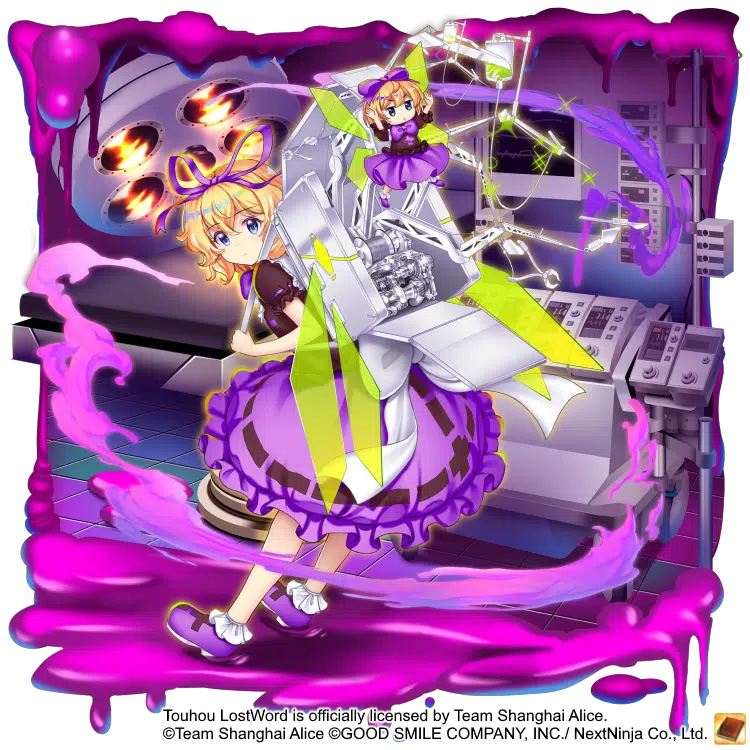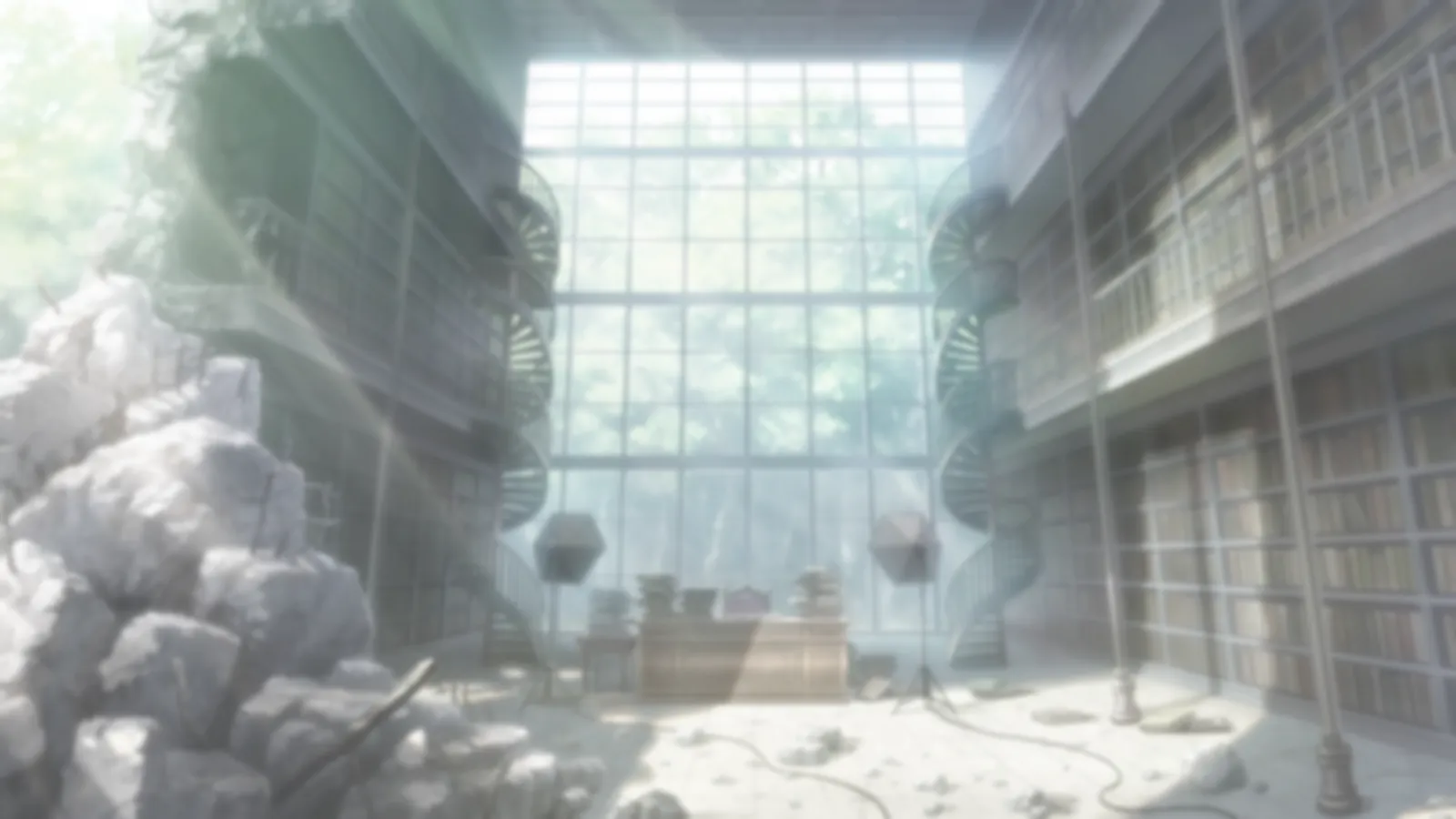Medicine Melancholy
Medical Automaton
The usual outfit of Medicine, the mechanical tool. The backpack toolbox is a part of her body.
Medical Automaton

The usual outfit of Medicine, the mechanical tool. The backpack toolbox is a part of her body.
Voice Lines
Voice Sets
Autonomous Medical Doll
VA: Inoue Honoka
Almost Broken Memory
VA: Saeki Iori
Abandoned Machine
VA: Murakami Natsumi
Character Information
Temperament: Seikanun
Seikanun (a Touhou LW original) refers to interstellar clouds of gas, dust, and plasma. This is the temperament of Medicine, an abandoned tool left in the Capital's Underground Waste Ward. Her temperament was reformed by exchanging magical principles for the laws of physics. This temperament is specialized to resist Moon Essence and Star Essence.
Ability/Backstory: Capable of manipulating poison (Concealed)
The ability of Medicine Melancholy, the mechanical tool (a Touhou LW original). Medicine's original ability became this one when it was concealed by the system of the Capital. However, due to miscellaneous adjustments and the construction of alternate functions, Medicine's poison-manipulating capabilities are unchanged. In quite a few parallel worlds, there is an organization called Xanadu located in the Capital's Underground Waste Ward. Even in worlds where there is no place called Xanadu, there is often an organization with that same name. These organizations are predominantly composed of "tools" that were produced by the Capital and later cast aside when new tools were developed (usually by the Temple of Plenty). This is why these tools are sometimes referred to as the Wasted. For some reason, they bear a striking resemblance to the youkai found in Gensokyo before it disappeared, even though they were supposedly produced in the Capital. Their memories and abilities might be lacking or different, but it's impossible not to think of them as the same youkai whose names they share. Thus, it begs to reason that the Capital created these tools based on something that already existed. There's no doubt that tools are an essential part of Gensokyo, as can be seen with the Satellites that accompany incident resolvers, such as Reimu's Yin-Yang-Orbs and Marisa's mini hakkero. There are also tsukumogami like those pictured in the Night Parade Scroll, instrument-based poltergeists, demon books, the Miracle Mallet, the Jeweled Pagoda, and a sutra scroll made from Makai materials... You could even call the P items a kind of tool. However, even among all these tools, dolls are special. They are figures of human beings. Dolls are obviously a type of tool, but you could also say that tools are types of dolls because all tools can be interpreted as parts taken from a doll. Even tools that don't seem to resemble any part of the human body are, in fact, extensions of the base human form. Humans cannot live without tools, so tools are a part of them. Tools function thanks to the magic they receive from humans, just like how arms and legs move after receiving a signal via the nervous system. These signals are controlled by neurotransmitters, which act similarly to natural neurotoxins. Perhaps this indicates a hidden use for Medicine's ability to manipulate poison.
Attacks
Inhalation
The Spread Shot of Medicine Melancholy, the mechanical tool (a Touhou LW original). She administers inhaled medicine in this attack. Poison is clearly a form of information because when cellular tissue receives the input of poison (i.e., false information), it malfunctions. This could also be said for medicine, with the only difference being whether the effects are desirable or not.
Bullets
- Inhalant Prescription
- Aerosol Prescription
- Dry Powder Inhalant Prescription
- Liquid Inhalant Prescription
- Steam Inhalant Prescription
- Soft Mist Inhalant Prescription
Injection
The Focus Shot of Medicine Melancholy, the mechanical tool (a Touhou LW original). She administers a medical injection in this attack. Everyone's afraid of injections. There's no way getting a needle jabbed into your body could ever be pleasant, and all humans hold an instinctual aversion to anything that could potentially destroy them beyond repair. Venomous snakes, wasps, and scorpions are probably hated for similar reasons. But don't worry... she's only administering medicine.
Bullets
- Injection Prescription
- Intradermal Injection Prescription
- Subcutaneous Injection Prescription
- Intravenous Injection Prescription
- Intramuscular Injection Prescription
- Intra-Arterial Injection Prescription
Medicine Sign: Transfusion
A Spell Card of Medicine Melancholy, the mechanical tool (a Touhou LW original). She performs a transfusion in this attack. The medical procedure of transferring bodily fluids, particularly blood, into humans took quite a while to catch on. Many people considered blood to be the source of life itself, inherited from one's ancestors, and something impure. When you consider these beliefs attached to blood, it's easy to imagine how profane the act of receiving someone else's blood was back then. They focused more on the mental and spiritual side of things than the physical. However, they weren't exactly wrong in their belief that blood records information about one's ancestors. Though, in truth, this applies to every cell in the body―blood is just easier to extract.
Bullets
- Transfusion
- Electrolyte Infusion
- Nutrient Infusion
- Plasma Volume Expander Infusion
- Osmotic Diuretic Infusion
- Combined Infusion
Medicine Sign: Combined Dosage
A Spell Card of Medicine Melancholy, the mechanical tool (a Touhou LW original). She administers medication in this attack. The history of medicine is a history of philosophy. In the past, people believed in the simple concept that universal truths are logical and consistent. They assumed that mother nature's laws govern the human body, that celestial objects influence the mind, and that there is only a tiny disconnect between humans and the rest of the universe. That's why so many "medical cures" caught on without any empirical evidence of their effectiveness. They used false logic to prescribe treatment methods based on how the properties of an illness related to universal truths. These methods were so prevalent for so long that the concepts of observing the effects of treatments, determining whether they actually work, and improving the processes through repeated testing were truly revolutionary. But thanks to that revolution, we're blessed with the medical knowledge and pharmaceutical products we have today.
Bullets
- Medicine Dosage
- Tablet Dosage
- Pill Dosage
- Powder Dosage
- Pellet Dosage
- Liquid Dosage
Non-Invasive Surgical Operation
The Last Word of Medicine Melancholy, the mechanical tool (a Touhou LW original). She performs surgery in this attack. Non-invasive treatments such as medication have quite a long history, unlike surgery, where doctors have to physically reach into a patient's body to treat them. The inside of a body is sacred while also being impure, so the adoption of surgical treatments that encroach on that domain was a big turning point in human history. However, the medical treatments of the future will develop beyond this. Medical nanomachines will blur the line between non-invasive and surgical treatments. By prescribing nanomachines in a similar method to medicinal inhalants, it will become possible for people to receive completely non-invasive surgery from the machines moving within their own bodies. Even without nanomachines, this mechanical doll, well-versed in human anatomy, can treat any condition by administering medicine and performing minimal surgical procedures. This is the ideal medical treatment that humanity has always strived for.
Bullets
- Anastomosis
- Suture
- Incision
- Excision
- Extraction
- Amputation
Skills
Skill: Swallowing Aid Jelly
Coating medicine in this jelly solution makes it easier to swallow. "Well done taking your medicine."
Skill: Memory Water
Water can dilute things until they're barely perceptible, and it stores the information of what it dilutes.
Skill: Trepanning
A procedure that releases trapped spirits by boring a hole into their hard bone prison.


